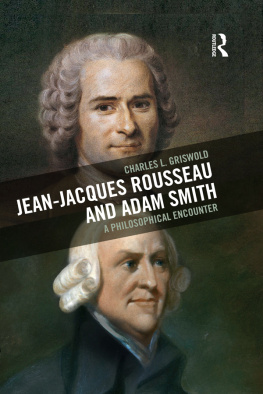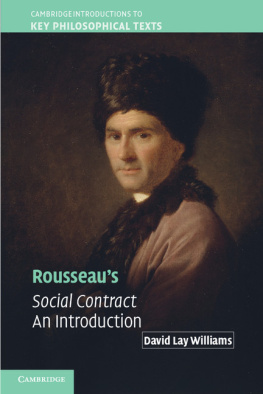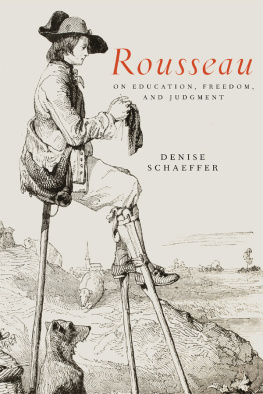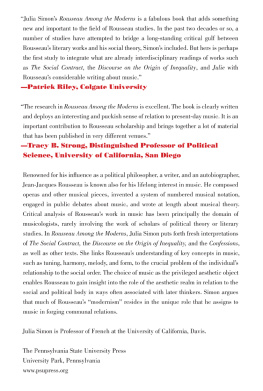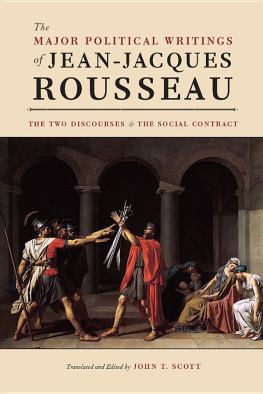Abandoned to Ourselves
Abandoned to ourselves,
being an essay on the emergence and
implications of SOCIOLOGY in
the writings of
MR. JEAN-JACQUES ROUSSEAU,
with special attention to his claims about
the moral significance of dependence in the
composition and self-transformation
of the social bond, & aimed to uncover the
tension between those two perspectives
CREATIONISM & SOCIAL EVOLUTION
that remains embedded in our
common sense & which still impedes
the human science of politics....
PETER ALEXANDER MEYERS
Yale
UNIVERSITY PRESS
New Haven and London
Published with assistance from the Annie Burr Lewis Fund.
Copyright 2013 by Peter Alexander Meyers.
All rights reserved.
This book may not be reproduced, in whole or in part, including
illustrations, in any form (beyond that copying permitted by
Sections 107 and 108 of the U.S. Copyright Law and except by
reviewers for the public press), without written permission from the publishers.
Yale University Press books may be purchased in quantity for educational,
business, or promotional use. For information, please e-mail sales.press@yale.edu
(U.S. office) or sales@yaleup.co.uk (U.K. office).
Set in Electra and Trajan types by Tseng Information Systems, Inc.
Printed in the United States of America.
Library of Congress Cataloging-in-Publication Data
Meyers, Peter Alexander.
Abandoned to ourselves : being an essay on the emergence and implications of sociology
in the writings of Mr. Jean-Jacques Rousseau, with special attention to his claims about the
moral significance of dependence in the composition and self-transformation of the social
bond, & aimed to uncover the tension between those two perspectivescreationism
& social evolutionthat remains embedded in our common sense & which still
impedes the human science of politics.... / Peter Alexander Meyers.
p. cm.
Includes bibliographical references and index.
ISBN 978-0-300-17205-8 (cloth : alk. paper)
1. Rousseau, Jean-Jacques, 17121778Political and social views.
2. Political sociology. I. Title.
JC179.R9M49 2012
306.2dc23
2011048887
A catalogue record for this book is available from the British Library.
This paper meets the requirements of ANSI/NISO Z39.481992 (Permanence of Paper).
10 9 8 7 6 5 4 3 2 1
Abandoned to Ourselves
Nous disions quil nest nullement probable, que le Crateur bon & sage, ait abandonn lhomme lui-mme, sans guide & sans direction pour sa conduite.... Que seroit lhomme & la Socit, si chacun toit tellement le matre de ses actions, quil pt tout faire son gr & navoir dautre principe de conduite que son caprice ou ses passions? Supposez que Dieu abandonnant lhomme lui-mme, ne lui eut effectivement prescrit aucune Rgle de vie, & ne leut assujetti aucune Loi.
Principes du droit naturel (1747, 163 & 158)
Jean-Jacques Burlamaqui
La plus utile et la moins avance de toutes les connoissances humaines me parot tre celle de lhomme, et jose dire que la seule inscription du Temple de Delphes contenoit un Prcepte plus important et plus difficile que tous les gros Livres des Moralistes.... ltude serieuse de lhomme, de ses facults naturelles, et de leurs dveloppemens successifs,.... les recherches Politiques et morales... consid[rent] ce que nous serions devenus, abandonns nous-mmes.
Discours sur lorigine et les fondemens de lingalit
parmi les hommes (1755, OC III.122, 127)
Jean-Jacques Rousseau
Hommes, soyez humains, cest vtre prmier devoir: soyez-le pour tous les tats, pour tous les ges, pour tout ce qui nest pas tranger lhomme. Quelle sagesse y a-t-il pour vous hors de lhumanit?
mile (1762, OC IV, 302)
Jean-Jacques Rousseau
We would say that it is hardly probable that the Creator, good and wise, had abandoned Man to himself, without guide and without direction for his conduct... What would Man and society be, if everyone was so much the master of his actions that he could do everything according to his own designs and have no other principle of conduct than his caprice and his passions? Suppose that God, abandoning mankind to ourselves, had effectively prescribed no rule of life for us, and had subjected us to no law.
Principes du droit naturel (1747, 163 & 158)
Jean-Jacques Burlamaqui
The most useful and least advanced area of all human knowledge seems to me to be Man himself, and I dare say that the lone inscription at the Temple of Delphi contained a precept more important and more difficult than all the fat books of the Moralists.... The serious study of Man, of his natural faculties and their successive developments,.... research into political and moral life.... considers what we would have become, abandoned to ourselves.
Discours sur lorigine et les fondemens de lingalit
parmi les hommes (1755, OC III.122, 127)
Jean-Jacques Rousseau
Men, be human, that is your primary duty: be human for every circumstance, for every age, for everything that is not foreign to mankind. What wisdom is there for you besides humanity?
mile (1762, OC IV, 302)
Jean-Jacques Rousseau
GENERAL CONTENTS
DETAILED CONTENTS
ACKNOWLEDGMENTS
This book stands at the intersection of a number of larger projects and summarizes some lines of my inquiry into political theory. It seems fitting, therefore, to dedicate it to my best and continuing teacher and lifelong friend Kurt P. Tauber.
Over the long period of its gestation, many people have privileged me with their reflections on the ideas set forth here. I would like to thank especially Benjamin R. Barber, Rdiger Bittner, Dborah Blocker, Peter Breiner, ric Brian, Claudia Brodsky, Craig Calhoun, Michelle Chilcoat, Giovanna C. Cifoletti, Andrew Feffer, David Gauthier, Harvey S. Goldman, Anthony T. Grafton, John Gunnell, Marie-Hlne Huet, Jonathan Israel, George Kateb, Nannerl O. Keohane, Pierre Manent, Bernard Manin, Patchen Markell, Jim Miller, Bruce Miroff, Amlie O. Rorty, Alan Ryan, Morton Schoolman, Will Selinger, Nancy S. Struever, Laurent Thvenot, Mino Vianello, Maurizio Viroli, and Linda Zerilli. In addition, I have benefitted immeasurably from the support of the Institut du Monde Anglophone of the Universit Sorbonne NouvelleParis III, the French Ministre de lducation nationale, the Centre National de la Recherche Scientifique, the Centre de Thorie du Droit, the cole des Hautes tudes en Sciences Sociales, the School of Historical Studies of the Institute for Advanced Studies in Princeton, the Department of Philosophy, the Department of History, the Department of Sociology, and the Department of French and Italian of Princeton University. Many ideas herein originally came to me around 1986, as I was making my initial attempts to write out a general theory of political power. However, it was the pressure of rich collegial dialogue and disagreement that subsequently led to their development, first around the Groupe de Sociologie Politique et Morale with Luc Boltanski and Laurent Thvenot, where I propounded these ideas several times to Bruno Latour, and then in sustained conversations, both real and imagined, with Mino Vianello and Craig Calhoun. I owe, too, a debt to many students; as we confronted Rousseaus texts together, they pushed me toward a clearer understanding of what remains vivid and useful in his writings. Again here, my every word, an act, is refracted by that miraculous lens, Effie Rentzou, and the uncanny patient delight of my son Alexi.
Next page

